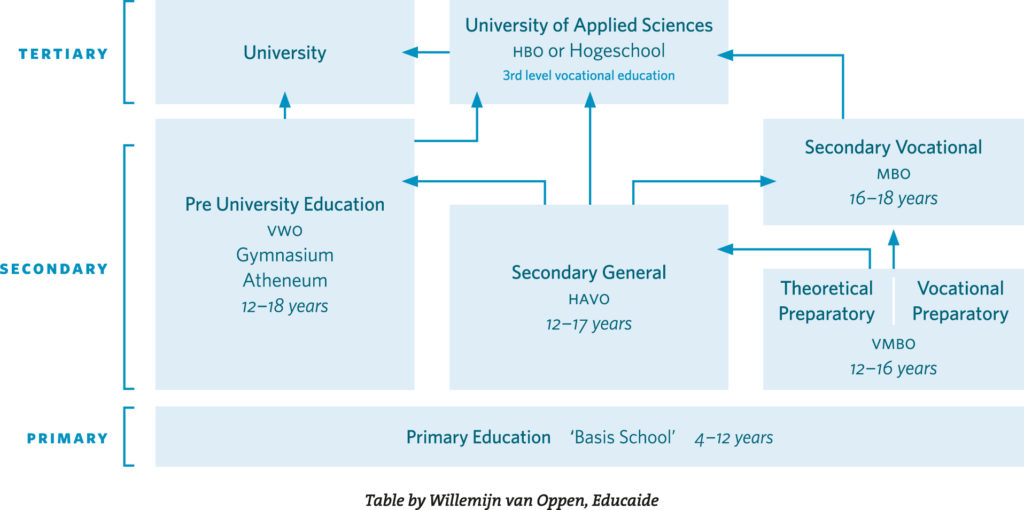The Dutch education system is totally different to that of a country like the UK! In the Netherlands, there are several educational paths a child can choose to pursue. What’s more, kids begin to be directed down one of these academic routes very early on in their lives. If you are moving to the Netherlands with children, read on. We will explain how the primary and secondary education systems work here, and how young expats can adapt to them.
Primary Education in the Netherlands
Primary education in NL works as follows:
- In the Netherlands, children attend primary school from the age of four and until they are twelve
- They spend their first two years in kindergarden
- In their final year, pupils are advised on which type of secondary education they should pursue
- This advice is based largely on the ‘leerlingvolgsystem’
- This is a monitoring system, which is used to register the achievements of pupils throughout their time at elementary school
- An aptitude test is also used to determine which type of school they should move on to. It is often referred to as the ‘CITO-toets‘, in Dutch
Secondary Education in the Netherlands
Secondary school education is where matters begin to get complicated in the Netherlands! This diagram illustrates how it works:

Let’s explain Dutch secondary education, in more detail:
- There are three types of secondary school pupils can choose from, once they have completed their primary school education
- All three start with a sort of ‘basic package’
- Usually, it lasts two years and consists of general subjects that all students follow
- The first year is called the ‘brugklas‘. In English, it is referred to as the ‘transition class’
- At the end of this year a final decision will be made, regarding the type and level of secondary education with which a student will continue
- This gives pupils one year to demonstrate the level at which they are capable of performing, and to think about which kind of schooling they wish to pursue
- In some secondary schools, this decision is made after two years
Educational Acronyms in NL
The different types of education in Holland go by the following acronyms:
1. VMBO
- VMBO is ‘Vocational Secondary education’
- It lasts four years
- VMBO caters for students of varying levels and abilities
- Depending on how well they perform at VMBO, a pupil might have the option of going on to attend a ‘HAVO’. You can find an explanation of HAVO education below
- Another option for them is to progress to a ‘Senior Secondary Vocational Education and Training Institution’. This type of institution is called an ‘MBO’ or a ‘middelbaar beroepsonderwijs‘, in the Netherlands
The other two forms of secondary education grant their pupils admission to higher education:
2. HAVO
- HAVO lasts five years
- Pupils are enrolled according to their ability
- HAVO-diplomas prepare students for admission to a university of applied sciences. These are known as ‘HBOs‘ in the Netherlands
3. VWO
- VWO lasts six years
- Pupils are enrolled according to their ability
- VWO is considered to be a more rigorous educational path than HAVO
- The curriculum prepares pupils for a ‘WO‘ university
Many secondary schools offer a mixed transition class. They might, for example, have a VMBO/HAVO or a HAVO/VWO.
Dutch School for Expat Kids
In Dutch schools lessons will be taught, unsurprisingly, in Dutch. Non Dutch-speaking four and five-year-olds usually acclimatize to this pretty easily. Still, just because your child is six years of age or older, it does not mean that he or she cannot be enrolled in a Dutch school.
Unsure about which kind of school is right for your kids? Take a look at our ‘Useful Links’ box at the bottom of this page. It lists several other xpat.nl pages, which offer further advice on this matter. Our article about learning Dutch in the Netherlands might be of interest to you as well!
Dutch Immersion Classes
Many Dutch schools ask that their pupils attend a Dutch immersion class:
- Dutch Immersion classes are called ‘schakelklas‘ or ‘nieuwkomersklas‘ in the Netherlands
- After approximately one year of attending an immersion class, a child should be able to transition to a regular Dutch school
- When possible, he or she will be enrolled in a class with other children of a similar age
- Some schools have their own, internal newcomer classes. Usually, however, this is only the case at specialized schools
Immersion Classes Post Primary School
There are secondary level Dutch immersion classes too:
- ‘Internationale schakelklas‘ is the Dutch phrase used to describe them
- Some cities also offer a ‘kopklas‘
- This class is designed for highly-motivated children, who have finished primary school with high grades for math, but much lower ones for the Dutch language
- The Kopklas is intended to help these pupils to follow a higher level of secondary education
- Often, this is against the initial advice of their high school
- If they have reached a high enough academic level after attending kopklas for one year, they will be admitted to a more demanding secondary education program
 Useful links
Useful links
Read more about Dutch education on our pages about:
- International education in the Netherlands
- Special education in the Netherlands
- Schooling for Expat Kids in NL
- International Schools in the Netherlands
- Local or International School in NL?
Find further information through the following organizations:

Understanding Mortgage Calculators ...
Buying a home in the Netherlands involves careful financial planning, especially for expats navigating the ...

Mortgage Interest Rates in 2025: Wh ...
As 2025 unfolds, expats navigating the Dutch housing market find themselves in a shifting financial ...

Remodeling your house in the Nether ...
Have you just bought or rented a house that needs remodeling – but have no idea ...

How to safely use public wifi netwo ...
Public Wi-Fi networks come with a significant risk to the security of your personal ...

Be prepared for the Dutch housing m ...
Buying a house in the Netherlands may work a bit differently to what you are ...

The UnDutchables 9.0
Following the legendary previous eight editions of The UnDutchables, the 9th edition of this all ...

This is your checklist for moving t ...
Do you plan to move to Amsterdam or somewhere else in our beautiful country to ...

Making the most of your Dutch home
Whether you are renting, staying in a long-term AirBNB or have just bought a ...

Gift giving in the Netherlands-all ...
If you feel like skipping your birthday, you may be in for a challenge when ...

10 things you will find in every Du ...
The Dutch are very fond of houseplants, the more the merrier! You will find the ...